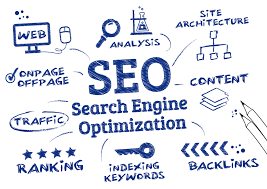The Power of SEO: Enhancing Your Online Presence
Search Engine Optimization (SEO) is a vital component of any successful online marketing strategy. In today’s digital age, where competition for online visibility is fierce, implementing effective SEO techniques can make a significant difference in how your website ranks on search engine results pages.
SEO involves optimising your website’s content, structure, and performance to improve its visibility and relevance to search engines like Google, Bing, and Yahoo. By enhancing your site’s SEO, you can attract more organic traffic, increase brand awareness, and ultimately drive more conversions.
Key Benefits of SEO:
- Increased Visibility: By optimising your website for relevant keywords and phrases, you can improve its ranking on search engine results pages, making it more visible to potential customers.
- Enhanced User Experience: SEO involves improving site speed, mobile responsiveness, and overall usability, creating a better experience for visitors and encouraging them to stay longer on your site.
- Builds Credibility: Websites that rank higher in search results are often perceived as more trustworthy and authoritative by users. Effective SEO can help establish your brand as a credible source in your industry.
- Cost-Effective Marketing: Compared to traditional advertising methods, SEO offers a cost-effective way to attract targeted traffic to your website without having to pay for each click or impression.
- Long-Term Results: While it may take time to see the full impact of SEO efforts, the benefits are long-lasting. By consistently implementing best practices, you can maintain and improve your website’s search engine rankings over time.
Getting Started with SEO:
If you’re new to SEO or looking to enhance your current strategy, here are some key steps to consider:
- Keyword Research: Identify relevant keywords and phrases that your target audience is likely to use when searching for products or services related to your business.
- On-Page Optimisation: Optimise your website’s meta tags, headings, images, and content with targeted keywords to improve its relevance and visibility.
- Quality Content: Create high-quality, engaging content that provides value to users and encourages them to share and link back to your site.
- Technical Optimisation: Ensure that your website is technically sound by addressing issues such as page speed, mobile-friendliness, crawlability, and security.
- Link Building: Earn backlinks from reputable websites in your industry to boost your site’s authority and credibility in the eyes of search engines.
In conclusion,
Understanding SEO: Applying Techniques, Definitions, Examples, and Types
- How do I apply SEO to my website?
- What is search engine optimization SEO?
- What is an example of SEO?
- What is SEO and its types?
How do I apply SEO to my website?
To apply SEO to your website, you need to start by conducting thorough keyword research to identify relevant search terms that your target audience is likely to use. Once you have a list of keywords, strategically incorporate them into your website’s meta tags, headings, content, and image alt text. Focus on creating high-quality, engaging content that provides value to users and encourages them to stay on your site. Additionally, ensure that your website is technically optimised for search engines by improving page speed, mobile responsiveness, and overall user experience. Building quality backlinks from reputable websites can also boost your site’s authority and visibility. Consistent monitoring and adjustments based on analytics data will help you refine your SEO strategy over time for optimal results.
What is search engine optimization SEO?
Search engine optimization (SEO) is a strategic approach to enhancing a website’s visibility and relevance on search engine results pages. In simple terms, SEO involves implementing various techniques and best practices to improve a website’s ranking for specific keywords or phrases that users commonly search for. By optimising factors such as content quality, meta tags, site structure, and backlinks, SEO aims to attract more organic traffic to a website and ultimately increase its online presence. Effective SEO not only helps websites rank higher in search results but also enhances user experience and credibility, making it an essential tool for businesses looking to succeed in the competitive digital landscape.
What is an example of SEO?
An example of SEO (Search Engine Optimization) in action is when a website owner strategically incorporates relevant keywords into their website content, meta tags, and headings to improve its visibility and ranking on search engine results pages. By optimising the website’s structure, content, and performance according to SEO best practices, the site becomes more likely to appear higher in search results when users search for related terms. This increased visibility can lead to more organic traffic, better user engagement, and ultimately, improved online presence and conversions for the website owner.
What is SEO and its types?
Search Engine Optimization (SEO) is a fundamental digital marketing strategy aimed at improving a website’s visibility and ranking on search engine results pages. It involves various techniques and practices that help websites appear higher in organic search results, thereby driving more relevant traffic to the site. SEO can be broadly classified into two main types: on-page SEO and off-page SEO. On-page SEO focuses on optimizing elements within the website itself, such as content, meta tags, and site structure, to improve its search engine visibility. Off-page SEO, on the other hand, involves external factors like backlinks, social signals, and online reputation management to enhance a website’s authority and credibility in the eyes of search engines. Both types of SEO work together to create a comprehensive strategy for increasing a website’s online presence and attracting valuable organic traffic.
